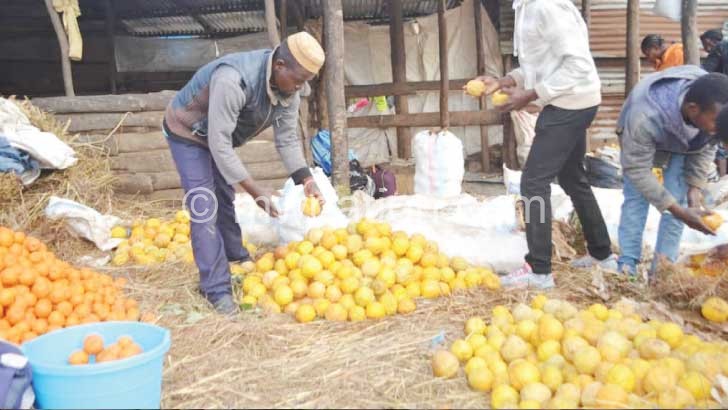Sour prices for Covid bites
Death is inescapable, but everyone will do their best to delay the inevitable end.
The desperate rush to stay clear of the fast-spreading coronavirus is driving up prices of goods said to lessen the suffering of infected persons.
When Malawi reported its first coronaviruss case on April 2, prices of water buckets, hand sanitisers, face masks and soap suddenly doubled, compelling the Competition and Fair Trading Commission to fine some companies for cashing in on the pandemic.
Similarly, the cost of lemons, garlic, tamarind and other sour bites is skyrocketing to meet rising demand.

‘I’m making money’
At Limbe Market, Rajab Yusuf now sells 13 bags of lemons a day to people desperate to lessen the deadly risk of coronavirus infection. This is almost twice the sales he used to make before the global outbreak discovered in China last December.
“I am making good money because the appetite for lemons is growing, thanks to widely shared information that acidic fruits relieve the suffering associated with Covid-19 [the coronavirus disease],” he brags.
Yusuf commutes from Zomba to Limbe Market, where he earns about K360 000 a day from the sour fruits selling like hot cakes.
Every week, the fruit vendor makes three trips to Mozambique to order lemons as Malawi has virtually run out of the commodity.
He returns with 20 to 25 bags, double the haul he used to procure from Ntcheu and Mwanza before the outbreak that has claimed 103 lives from the country’s over 4 000 confirmed cases.
Counting his gains, he states: “A bag goes at K28 000. This is not small change considering that I sell 13 a day. Some are lost in transit, especially during border checks.”
Lemons in Malawi are out of season and Yusuf fears that businesspeople like him may soon run out of supply when the orchards in the neighbouring country run dry.
In the middle of Limbe, customers have to dig deeper in their pockets to get the fruit and tubers believed to ease the pain and likelihood of catching the respiratory disease.
Veronica Kasonda, from the populous Manje Township,Blantyre, spends K500 on four lemons that once cost just K200.
Her frantic strategy to safeguard her family from the pandemic eats into invaluable income “better spent on food and other basic needs”, she says.
“The price hike for lemons, ginger and garlic is making me poorer just when travel bans make it tough to make money. I don’t earn much from supplying water in construction sites,” she says.
To improve her earnings, Kasonda joined the fast trade in lemons every time she has more than K1 000.
From a customer to a seller, she is maximising her proceeds.
“I rely on piecework and small business to feed my family. I don’t want them to die. I believe that lemons reduce the risk of coronavirus infection because many say so,” she explains.
The acidic prices testify to the power of the social media where the truth about pandemics is buried in myths and misconceptions from some Covid-phobic people.
Dr Charles Mwansambo, chief director of health services in the Ministry of Health, says it is not true that lemons, garlic, tamarind and ginger offer coronavirus patients some pain relief.
The medical doctor urges people to take a diversified diet containing all six food groups, including fruits containing citric fruits that fortify body defence to diseases.
He explains: “Food containing acid is advisable because it supplies energy required to fight against any disease. As such, you need to eat a balanced diet, including fruits that increase antibodies to fight against any infection in a person’s body.
“So far, there is no scientific evidence that lemons and other foodstuffs containing acid can cure Covid-19.”
According to the World Health Organisation, Covid has no cure or vaccine.
A rip-off
As people turn to sour foods, Consumers Association of Malawi executive director John Kapito warns against the rip-offs faced by Malawians anxious to stay alive.
“It is disheartening that some businesspeople have taken Covid-19 as a way of stealing from the public. We are warning all of them, particularly those selling lemons and other items deemed to be helpful in combating the pandemic, to stop theft,” he said.
Kapito also called upon government officials to help in ensuring that consumer rights are observed by every Malawian.





